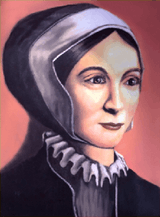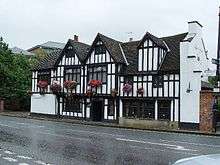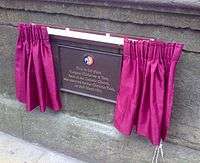Margaret Clitherow
Saint Margaret Clitherow (1556 – 25 March 1586) is an English saint and martyr of the Roman Catholic Church,[2] sometimes called "the Pearl of York". She was pressed to death for refusing to enter a plea to the charge of harbouring Catholic priests, and canonised in 1970 by Pope Paul VI.
Saint Margaret Clitherow | |
|---|---|
 | |
| one of the Forty Martyrs of England and Wales | |
| Born | 1556 York, Yorkshire, England[1] |
| Died | 25 March 1586 York, Yorkshire, England |
| Venerated in | Roman Catholic Church |
| Beatified | 15 December 1929 by Pope Pius XI |
| Canonized | 25 October 1970, Rome by Pope Paul VI |
| Major shrine | The Shambles, York, North Yorkshire, England |
| Feast | 30 August |
| Patronage | businesswomen, converts, martyrs, Catholic Women's League, Latin Mass Society |
Life
Margaret Clitherow was born in 1556,[3] one of five children of Thomas and Jane Middleton. Her father was a respected businessman, a wax-chandler and Sheriff of York in 1564,[4] who died when Margaret was fourteen. In 1571, she married John Clitherow, a wealthy butcher and a chamberlain of the city, and bore him three children; the family lived in The Shambles.
She converted to Roman Catholicism in 1574. Although her husband, John Clitherow, belonged to the Established Church, he was supportive as his brother William was a Roman Catholic priest.[5] He paid her fines for not attending church services. She was first imprisoned in 1577 for failing to attend church, and two more incarcerations at York Castle followed.[6] Her third child, William, was born in prison.[7]

Margaret risked her life by harbouring and maintaining priests, which was made a capital offence by the Jesuits, etc. Act 1584. She provided two chambers, one adjoining her house and, with her house under surveillance, she rented a house some distance away, where she kept priests hidden and Mass was celebrated through the thick of the persecution.[4] Her home became one of the most important hiding places for fugitive priests in the north of England. Local tradition holds that she also housed her clerical guests in the Black Swan Inn at Peaseholme Green, where the Queen's agents were lodged.[7]
She sent her older son, Henry, to the English College, relocated in Reims, to train for the priesthood. Her husband was summoned by the authorities to explain why his oldest son had gone abroad, and in March 1586 the Clitherow house was searched.[8] A frightened boy revealed the location of the priest hole.[6]
Margaret was arrested and called before the York assizes for the crime of harbouring Roman Catholic priests. She refused to plead, thereby preventing a trial that would entail her three children being made to testify, and being subjected to torture. Although pregnant with her fourth child,[4] she was executed on Lady Day, 1586, (which also happened to be Good Friday that year) in the Toll Booth at Ouse Bridge, by being crushed to death by her own door, the standard inducement to force a plea.[9]
The two sergeants who should have carried out the execution hired four desperate beggars to do it instead. She was stripped and had a handkerchief tied across her face then laid across a sharp rock the size of a man's fist, the door from her own house was put on top of her and loaded with an immense weight of rocks and stones so that the sharp rock would break her back. Her death occurred within fifteen minutes, but her body was left for six hours before the weight was removed.
Veneration
Clitherow was beatified in 1929 by Pope Pius XI and canonised on 25 October 1970[10] by Pope Paul VI among the Forty Martyrs of England and Wales. Their feast day in the current Roman Catholic calendar is 4 May in England and 25 October in Wales. She is also commemorated in England on 30 August, along with martyrs Anne Line and Margaret Ward.
A relic, said to be her hand, is housed in the Bar Convent in York.[6]
St. Margaret's Shrine is at 35-36 The Shambles. John Clitherow had his butcher's shop at 35.[11] However, the street was re-numbered in the 18th century, so it is thought their house was actually opposite.[10]
Legacy
St Margaret Clitherow is the patroness of the Catholic Women's League.[12] Church - Saint Margaret Clitherow - Grahame Park ,Colindale London. A number of schools in England are named after Margaret Clitherow, including those in Bracknell, Brixham, Manchester, Middlesbrough,Thamesmead SE28, Brent, London NW10 and Tonbridge. The Roman Catholic primary school in Nottingham's Bestwood estate is named after Clitherow.[13] In the United States, St Margaret of York Church and School in Loveland, a suburb of Cincinnati, Ohio, is also named after her. Another school named after her is St Margaret Clitherow RC Primary School, located next to Stevenage Borough Football Club.
She is a co-patroness of the Latin Mass Society, who organise an annual pilgrimage to York in her honour. A group of parishes in the Roman Catholic Archdiocese of Liverpool, Sacred Heart in Hindsford, St Richard's in Atherton, Holy Family in Boothstown, St Ambrose Barlow in Astley, St Gabriel's, Higher Folds in Leigh are now united as a single community with St Margaret Clitherow as its patron.[14][15]
The English poet and Jesuit priest Gerard Manley Hopkins wrote a poem honouring "God's daughter Margaret Clitheroe."[16] The poem, entitled "Margaret Clitheroe" was among fragments and unfinished poems of Hopkins discovered after his death and is a tribute to the woman, to her faith and courage, and to the manner of her death.[17]

In 2008, a commemorative plaque was installed at the Micklegate end of York's Ouse Bridge to mark the site of her martyrdom; the Bishop of Middlesbrough unveiled it in a ceremony on Friday 29 August 2008.[18]
See also
- Bar Convent
- Forty Martyrs of England and Wales
- Saint Margaret Clitherow, patron saint archive
References
- "Saint Margaret Clitherow", Britannica.com
- Rayne-Davies, John (2002). Margaret Clitherow: Saint of York. Beverley : Highgate of Beverley. ISBN 1-902645-32-4.
- "About St. Margaret", St. Wilfrid's Roman Catholic Church - York
- Camm, Bede. "St. Margaret Clitherow." The Catholic Encyclopedia Vol. 4. New York: Robert Appleton Company, 1908. 27 March 2016
- The Little Black Book: Six-minute reflections on the Weekly Gospels of Lent 2009, page about "The Pearl of York", published by the Diocese of Saginaw Archived 22 October 2007 at the Wayback Machine
- "Margaret Clitherow", History of York
- McSheffery, Daniel F., "St. Margaret: Mother and Martyr", The Homiletic & Pastoral Review, April 1994
- Stevens, Clifford. "St. Margaret Clitherow", The One Year Book of Saints, Our Sunday Visitor Publishing
- McGoldrick, T.A., "Saint Margaret Clitherow", Catholic Pamphlets
- Green, Carole. "The Pearl of York", BBC- North Yorkshire, 10 September 2008
- "The history of The Shambles York England - Margaret Clitherow", Hotels in York Ltd
- "Our Saint", Catholic Women's League of England and Wales
- "St Margaret Clitherow Primary and Nursery Catholic Voluntary Academy, Nottingham". Archived from the original on 31 March 2016. Retrieved 28 March 2016.
- The Catholic Church in the Leigh Area, Leigh Pastoral Area, archived from the original on 13 December 2012, retrieved 28 April 2013
- History, sacredheartrchindsford.co.uk, archived from the original on 15 August 2013, retrieved 28 April 2013
- Garner, W. H. (ed.) (1953), Gerard Manley Hopkins: Poems and Prose, Harmondsworth: Penguin, pp. 78-80
- "The Poet's Eye: Gerard Manley Hopkins' "Margaret Clitheroe"". Catholicism.org. 16 October 2008. Retrieved 16 November 2015.
- "Bishop Terry to unveil plaque to St Margaret Clitherow". The Roman Catholic Diocese of Middlesbrough. 29 August 2008. Retrieved 15 November 2010.

Further reading
- Peter Lake and Michael Questier, 2011, The Trials of Margaret Clitherow: Persecution, Martyrdom and the Politics of Sanctity in Elizabethan England: New York/London: Continuum ISBN 1-4411-0436-4
External links
Margaret
- World News Network: Margaret Clitherow
- HighBeam Research: Encyclopedia.com: Clitherow, Margaret (1556–1586)
- Kate Emerson Historicals: A WHO’S WHO OF TUDOR WOMEN: M (search for "MARGARET MIDDLETON")
- rootsweb: ANCESTRIES of Errol BEVAN and Hollie Atkinson BEVAN - with a MULTITUDE of Cousin Lines!: Margaret MIDDLETON
- David Alton: The Secret Resting Place of Margaret Clitherow
- Let The Welkin Ring: St Margaret Clitherow (blog entry about 2011 pilgrimage to her shrine)
- Works by or about Margaret Clitherow in libraries (WorldCat catalog)
- Cooper, Thompson (1887). . Dictionary of National Biography. 11. p. 103.
Children
- Kate Emerson Historicals: A WHO’S WHO OF TUDOR WOMEN: Cl-Cy (search for "ANNE CLITHEROW" — Margaret's daughter)